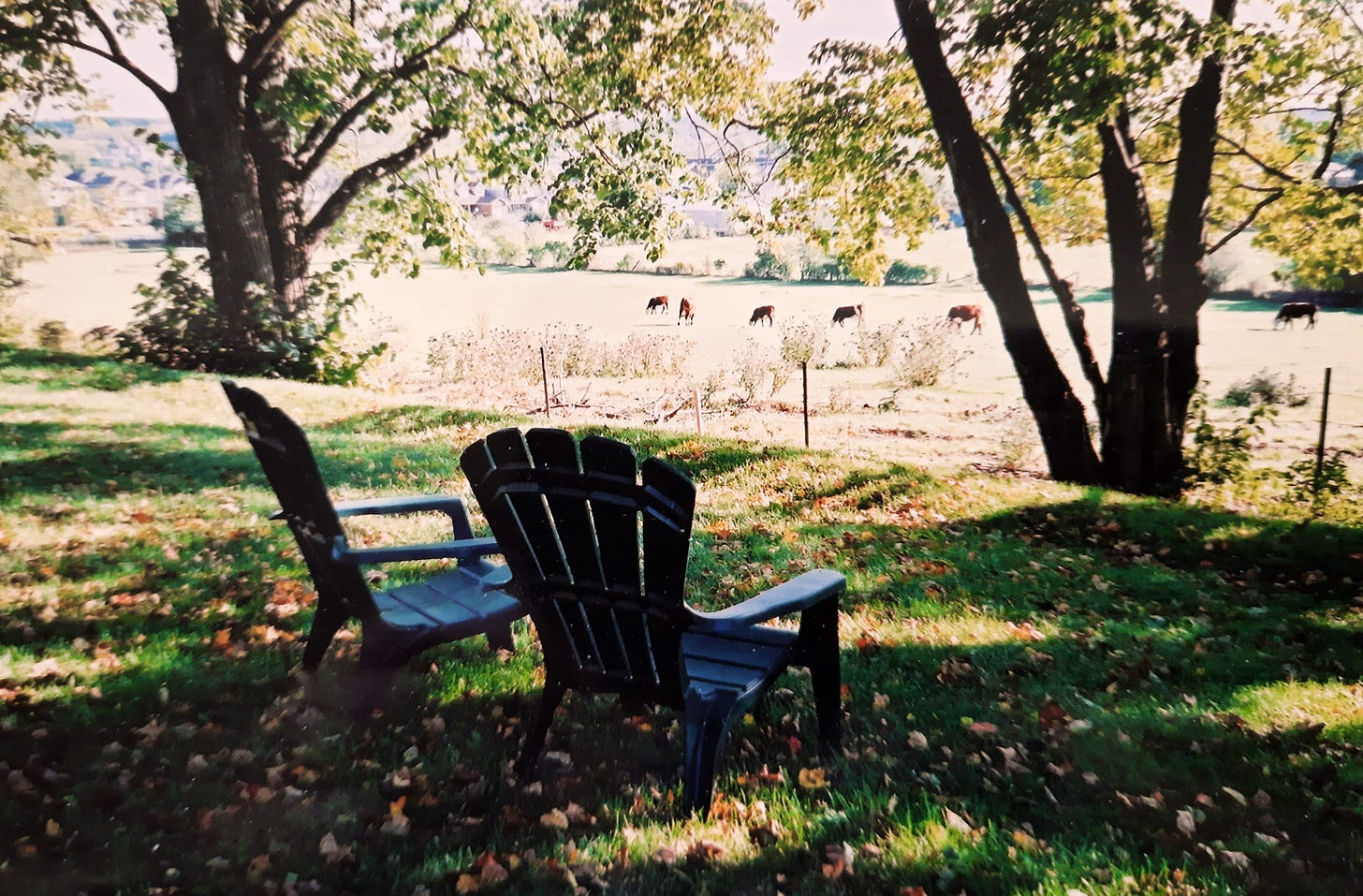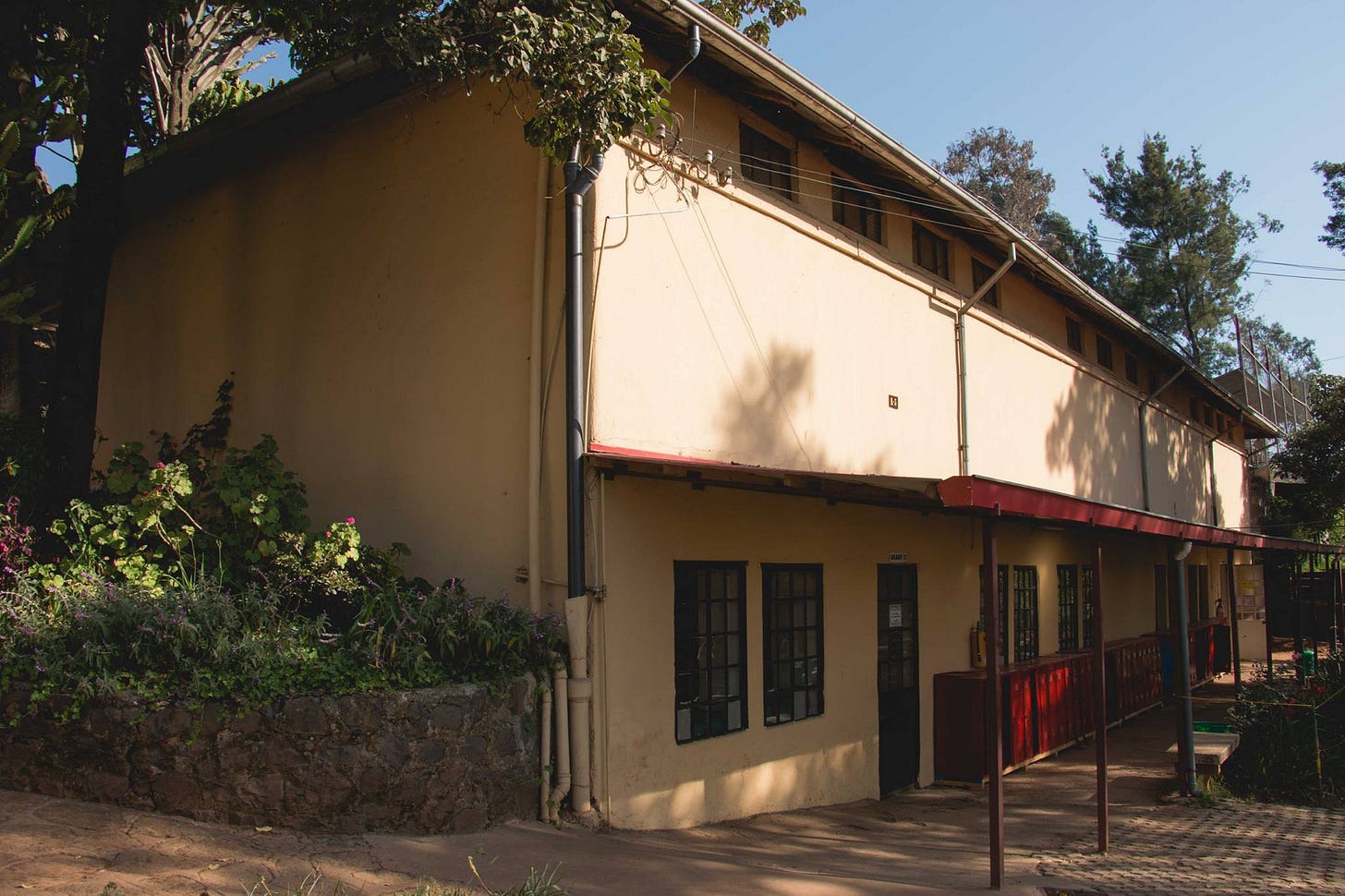Hi friends,
If you and I sat down for a coffee to talk about significant things that have happened in our lives in the last month, I would tell you about Raspberry Lane. Isn’t it a delightful name for a street? I moved there when I was 15 years old and it’s been a home, a haven, and a basecamp for 24 years.
The house was the place where my mom kept salami on hand at all times in case my friend Allison stopped by to raid our fridge. It’s where my 7 year-old sister slipped drawings under my bedroom door to comfort me when my friend died. It’s where my husband had to sit butt-naked in a sauna with my Finnish dad to ask for his blessing to marry me. Often at 11pm, we’d all congregate in the living room to watch CTV News with Lloyd Robertson.
The house just felt so familiar. The predictable creak of the second-last step in the staircase, the dappled sunlight on the leather couches in the afternoons, the tub filling for one of my sister's luxuriant baths – these little things had baked themselves into the fabric of the house, making it feel almost as if it had a heartbeat.
It’s just a house. Bricks and wood and drywall. But when I parents moved last month, I had a hard time holding back the tears.
When a house, neighbourhood, or community has truly become a home, moving feels profoundly sad. Losing a home is a unique kind of loss. You can’t find a card for it at a store. And yet it’s so common because it covers many of life’s circumstances.
We upsize or downsize.
We get evicted.
We take a job or go off to university.
We flee violence or political instability.
We get married.
We get divorced.
We get injured.
We lose our income.
We pursue a dream.
We lose a loved one.
We get old.
What saying goodbye to a home shares with other forms of loss is that it’s deeply personal. In the words of Michael Messenger, “home is where the rhythm of my heart beats with the rhythm of a place.” What it is we miss can feel abstract, so our clumsy attempts to put it into words often falls short.
I watched a movie about a political prisoner who survived years of imprisonment by clinging to a specific image of home: the mundane task of putting his key in the front door. That simple act of opening the door to his house was the very essence of freedom. The comfort of that image kept him alive. It makes me wonder what simple aspects of home I would daydream about in his situation.

Perhaps the deepest loss is when we can’t return. Have you ever gone back to a place you once felt at home and it just feels “off?” Maybe it’s gotten run down or people have moved on, or your outlook has changed so it’s you who doesn’t fit the place anymore. As Jeanine Cummins puts it so eloquently in her novel, American Dirt, we end up having “nostalgia for a phantom limb.”
It’s how I felt a few years ago when I went back to visit my school in Addis Ababa, Ethiopia. At first I ran around the property with delight, breathlessly showing my husband, Jay, all the physical spots that held so many memories.
(A funny aside: I laughed when I saw my fourth grade classroom, pictured below. As a ten year-old, I’d tried to excuse myself from a math game. I was still learning English and had heard adults throw around the word “jet lag.” I thought I’d give it a shot despite not knowing what the word meant. I solemnly approached my teacher and said I couldn’t play because I was jet lagged. She informed me that it was the middle of the school year and I hadn’t travelled anywhere.)
Ah, my face ached with smiling as I thought back to those days. But then there it was – an undeniable sadness like a heavy blanket, pressing down on me. My initial delight gave way to sadness. The physical space was much the same, but the essence of it was gone.
Because a home was more than a place. It was moment in time. It was populated with people who all brought a unique flavour out of each other and their surroundings. Home wasn’t just a place but my place in it. I could take my body back but I couldn’t turn back time.
Home’s not merely roof and room
It needs something to endear it
Home is where the heart can bloom
Where there’s some kind lip to cheer it
- Charles Swain
I sat down in the shade of a tree where we used to get class photos. In that quiet moment I sensed God say, “Michelle, I know the essence of what you miss. I was here in this place with you back then, and I am with you now. You do not carry this loss alone. You don’t need to explain yourself to me. Let my heart be your home.”
The words of the Psalmist reflect this intimate assurance:
“You discern my going out and my lying down;
you are familiar with all my ways.” (Psalm 139:3)
Friend, what is the essence of home(s) that you miss?
What were the “familiar ways” you loved?
What’s the thing you remember and yearn for that can’t be encapsulated in a single sentence?
That is what God understands. The smells, the sounds, the people. How you felt in that place. He gets it. He sees you. He is familiar with all your ways.
In Wales they have a word for this: hiraeth. It’s an abstract concept which can be described as a blend of homesickness, nostalgia and longing. It’s a “pull on the heart that conveys a distinct feeling of something irretrievably lost.” Sometimes it can even feel like missing a place you’ve never been.
And may I suggest that the longing itself holds an invitation?
In his book, Things Unseen, Mark Buchanan writes about what lies beneath our homesickness:
“Our deepest instinct is heaven. Heaven is the ache in our bones, the splinter in our heart…We are metaphysically handicapped. This is not so much a design flaw as a designed flaw, a glitch wired into the system, a planned obsolescence. He put in me, in you, a homing device for heaven. We just won’t settle for anything less.”
Could it be that the very act of looking back to what’s been lost is an invitation to look ahead to what will be given? Nostalgia is a holy instinct that God uses to propel our hearts us toward the ultimate reality – his presence making a home in us.
Someone told me once that she hoped heaven would feel like all of her homes coming together in one place . . . to no longer feel the ache of her fractured pieces lying scattered in unreachable lands. Oh how I yearn for this!
In John 14:2-3, Jesus promises his disciples something I find profoundly comforting: “My Father’s house has many rooms; if that were not so, would I have told you that I am going there to prepare a place for you? And if I go and prepare a place for you, I will come back and take you to be with me that you also may be where I am.”
So that you may be where I am.
Our homes here on earth – those places of belonging that we are forced at times to say goodbye to – are a foretaste of the home God has created us for. And we can already access it in part now because it resides in his very presence. To adapt Michael Messenger’s words, “home is where the rhythm of my heart beats with the rhythm of a person.”
This is a home that cannot be lost or stolen. It is safe from the consuming entropy of time. It is a key that can never be taken away.
So as I grieve the loss of Raspberry Lane, I am comforted by the mysterious hope that this longing itself is a homing device for an ultimate reality. Someday (and even in part right now) my hiraeth will be satisfied. I have a home in the heart of a God who knows my deepest longings, and I need not cling to the comforts of anything less.
It is a good, good thing to have a home.
But now that I have gone from it,
let me steward well, O God, this homesick gift,
as I know my wish for what has been is not some solitary ache,
but is woven with a deeper longing for what will one day be.
— Doug McKelvey
Ponderables
How would you describe the essence of home? If you weren’t able to return to the home you now have, what would you miss most?
Have you experienced a space/community/moment in time “where the rhythm of your heart beat with the rhythm of a place?”
Do you ever feel like your home is in multiple places? What does this feel like?
What about your home could be a foretaste of a bigger reality?
Reflect on this verse from John 14:23: Jesus answered him, “If anyone loves me, he will keep my word, and my Father will love him, and we will come to him and make our home with him.”
Ideas for Leaving a Home
SAY A PHYSICAL GOODBYE
If you can, walk into each room (preferably with a few others) and share memories together. Thank God for how you’ve seen his faithfulness there. If you can’t go into the physical space, or if “home” is more abstract, find another meaningful way to gather and practice thankfulness.
FEEL THE ACHE
An empty stomach hurts because there’s an ache in absence. Let yourself feel the sadness. Bring that hollow, raw feeling to God. Don’t push it down. Let him comfort you and fill you.
SOAK IN THIS LITURGY
Listen to this wonderful poem by Doug McKelvey: A Liturgy for Those with an Inconsolable Homesickness.
BLESS/PRAY FOR THOSE COMING AFTER YOU
During my final night sleeping in my old bedroom, I prayed for the people who would live in the house after us. I prayed that God’s presence would permeate the walls and create an undeniable place of peace. It reminded me that I was not simply losing something I loved, but had an active role in handing off a gift from God.
ACKNOWLEDGE HOW YOU’VE CHANGED IN THIS PLACE
Where were you at with Jesus when you arrived here? Where are you at now? In what ways have you matured emotionally, relationally, spiritually? I this place had a little plaque with a one sentence description of your time here, what would it say?

Maybe you’re homesick for where you used to be with God and don’t know how to get back there. Chris Renzema’s song Tear my House Down is a prayer:
So take me back to where I started
Take me back to when I was
In your heart, and in your home
Before I went out on my own
Tear this house down to its foundations
Break what you must break in me
On the shores of your salvation
Cast my man-made kingdom into the sea
Friend, God knows you. God sees you. May he be ever increasingly the home of your heart, and your heart his.
I’m eager to hear your experiences and thoughts on home. Please feel free to comment below!
Michelle






Such a lovely reflection Michelle, thank you